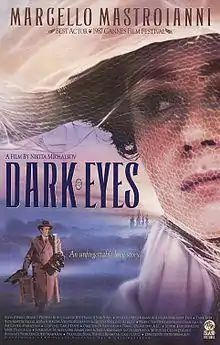Dark Eyes (1987 film)
Dark Eyes (Italian: Oci ciornie; Russian: Очи чёрные óchi chjórnyje) is a 1987 Italian and Russian film which tells the story of a 19th-century married Italian who falls in love with a married Russian woman. It stars Marcello Mastroianni and Yelena Safonova.[1] It received positive reviews from critics.
| Dark Eyes | |
|---|---|
 Film poster | |
| Directed by | Nikita Mikhalkov |
| Produced by | Carlo Cucchi Silvia D'Amico Bendico |
| Written by | Alexander Adabashyan Nikita Mikhalkov Suso Cecchi d'Amico Anton Chekhov (stories) |
| Starring | Marcello Mastroianni Marthe Keller Yelena Safonova Pina Cei Vsevolod Larionov Innokenti Smoktunovsky |
| Music by | Francis Lai |
| Cinematography | Franco Di Giacomo |
| Edited by | Enzo Meniconi |
| Distributed by | RUSCICO |
Release date | 9 September 1987 |
Running time | 118 minutes |
| Country | Italy Soviet Union |
| Language | Italian / Russian / French |
Plot
One day, on board a steamer, Romano (Marcello Mastroianni), a middle-aged Italian, tells to a Russian man the story of his life. He narrates his encounter with a young Russian lady with dark beautiful eyes, their brief romantic interlude and his sudden abandonment. Haunted by the memory of that lady, Romano travels to Russia to find her.
Source material
The film was adapted from (or rather inspired by) four Anton Chekhov's stories, notably The Lady with the Dog, by a Soviet-Italian team that included Alexander Adabashyan, Suso Cecchi d'Amico and Nikita Mikhalkov. The latter directed. The title refers to a famous Russian art song.
Cast
- Marcello Mastroianni as Romano Patroe
- Marthe Keller as Tina, Romano's Mistress
- Yelena Safonova as Anna Sergeyevna, Governor's Wife
- Isabella Rossellini as Claudia, Romano's daughter
- Pina Cei as Elisa's Mother
- Vsevolod Larionov as Pavel Alekseev, Russian Ship Passenger
- Innokenti Smoktunovsky as the Governor of Sysoyev
- Roberto Herlitzka as Lawyer
- Paolo Baroni as Manlio
- Oleg Tabakov as Pavel Vasilyevich, His Excellency
- Yuri Bogatyryov as Alexander, Sysoev Marshall
- Dmitri Zolotukhin as Konstantin Stepanovich, veterinarian in Sysoev
- Silvana Mangano as Elisa, Romano's Wife
- Jean-Pierre Bardos as Laying guest
- Nino Bignamini as Buyer
- Maria Grazia Bon as His wife
Location
Principal shooting took place at the Montecatini Terme in Tuscany, in the Volga town of Kostroma, and in Leningrad (Vladimir Palace, Peter and Paul Fortress).
Reception
Critical response
Dark Eyes has an approval rating of 100% on review aggregator website Rotten Tomatoes, based on 9 reviews, and an average rating of 7.84/10.[2]
Awards
Mastroianni received the award for Best Actor at the 1987 Cannes Film Festival[3] and was nominated for the Academy Award for Best Actor. Safonova was awarded the David di Donatello as Best Actress. Costume Designer Carlo Diappi was awarded the Ciak d'oro (Golden Ciak).[4]
See also
- The Lady with the Dog (1960)
References
- "NY Times: Dark Eyes". NY Times.com. Retrieved 2009-04-01.
- https://www.rottentomatoes.com/m/dark_eyes_1987
- "Festival de Cannes: Dark Eyes". festival-cannes.com. Retrieved 2009-07-19.
- https://www.ciakmagazine.it/ciak-doro-2018-tutti-i-premi/
